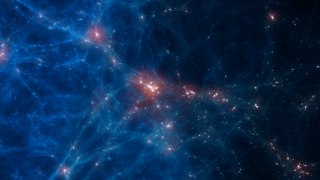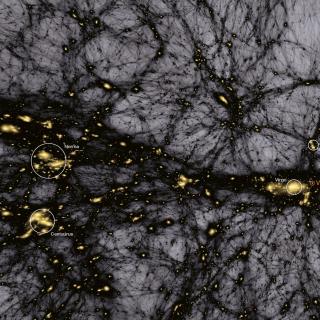Bibcode
Tramonte, D.; Rubiño-Martín, J. A.; Betancort-Rijo, J.; Dalla Vecchia, C.
Referencia bibliográfica
Monthly Notices of the Royal Astronomical Society, Volume 467, Issue 3, p.3424-3442
Fecha de publicación:
5
2017
Número de citas
12
Número de citas referidas
9
Descripción
We compare the predicted conditional mass function (CMF) of dark matter
haloes from two theoretical prescriptions against numerical N-body
simulations, both in overdense and underdense regions and at different
Eulerian scales ranging from 5 to 30 h-1 Mpc. In particular,
we consider in detail a locally implemented rescaling of the
unconditional mass function (UMF) already discussed in the literature,
and also a generalization of the standard rescaling method described in
the extended Press-Schechter formalism. First, we test the consistency
of these two rescalings by verifying the normalization of the CMF at
different scales, and showing that none of the proposed cases provides a
normalized CMF. In order to satisfy the normalization condition, we
include a modification in the rescaling procedure. After this
modification, the resulting CMF generally provides a better description
of numerical results. We finally present an analytical fit to the ratio
between the CMF and the UMF (also known as the matter-to-halo bias
function) in underdense regions, which could be of special interest to
speed up the computation of the halo abundance when studying void
statistics. In this case, the CMF prescription based on the locally
implemented rescaling provides a slightly better description of the
numerical results when compared to the standard rescaling.
Proyectos relacionados

Astrofísica Numérica: Formación y Evolución de Galaxias
Entre las cuestiones fundamentales en Astronomía y Astrofísica están la formación y evolución de galaxias. Las escalas de tiempo y tamaño son tan astronómicas que su observación en galaxias individuales es imposible. Solo con el uso de simulaciones numéricas es posible entender la formación de estructuras cósmicas dentro del actual marco
Claudio
Dalla Vecchia

Cosmología con Trazadores de la Estructura a Gran Escala del Universo
El Fondo Cósmico de Microondas (FCM) contiene la información estadística de las semillas primigenias que han dado lugar a la formación de todas las estructuras en el Universo. Su contrapartida natural en el Universo local es la distribución de las galaxias que surgen como resultado del crecimiento gravitatorio de aquellas fluctuaciones de densidad
FRANCISCO SHU
KITAURA JOYANES